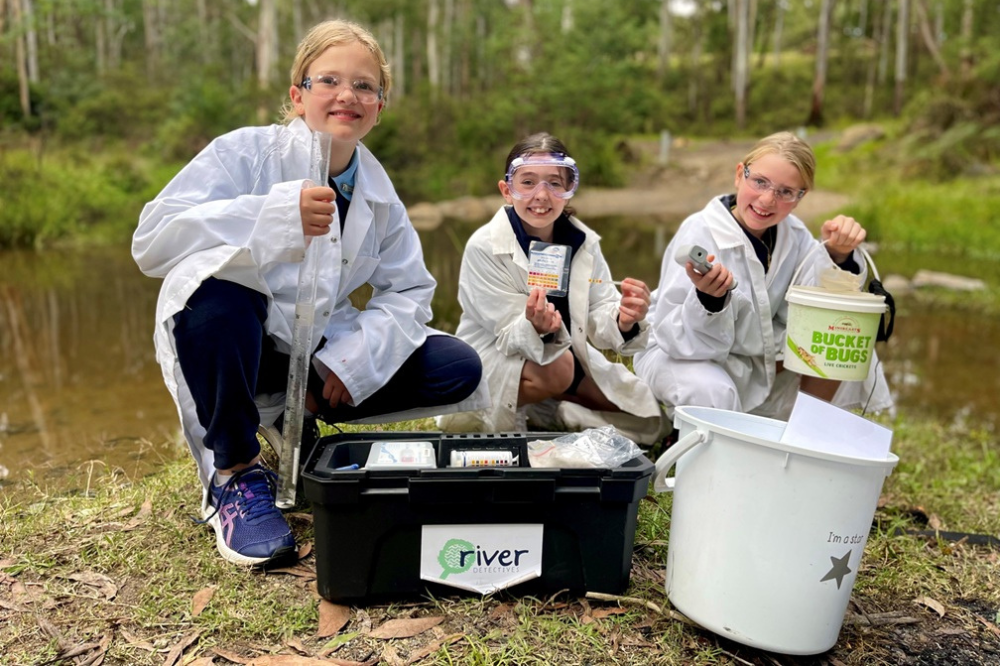
With no access to mains, water, or gas, Harkaway Primary School – nestled on the lands of the vast Boonwurrung nation – relies on rainwater harvesting and solar power, showing students firsthand the importance of sustainable living.
After all, if there is no energy, no water, and no toilets, there is no school.
From “I Sea I Care” ambassadors teaching preschoolers about water conservation to student-led waste reduction initiatives, Harkaway kids are learning to protect their environment – and inspire others to do the same. These young leaders even collaborate internationally, proving that tackling climate change is something anyone, at any age, can work towards together.
Principal Leigh Johnson said the school’s physical environment played an important part in influencing the way his leadership team set the direction and priorities of Harkaway’s sustainability programs.
“As school leaders we are deeply aware of the need to equip our children to adapt to a world impacted by climate change. Our school grounds are the perfect platform through which to do this,” Johnson told The Educator.
“Three-hundred-year-old trees, sugar gliders, visits from the local wild peacock, bent wing micro bats and so many more iconic wildlife and vegetation all call our grounds home.”
Johnson said Victoria’s Climate Change Strategy and the Department of Education Strategic Plan both align around empowering students to take action to shape their world.
“Climate change education is focused on action and hopeful in nature. It all starts by being grounded and aware of our ‘place’,” Johnson said.
“Given that we are on the Bushfire At Risk Register, we curate learning experiences for our children to read the ‘signs’ all around them and take child centred risk reduction behaviours.”
Student-led sustainability
Johnson said giving kids the power to shape their world is why the school exists.
“As a principal, success is any time Harkaway kids see a problem, form a plan, then take meaningful - hopeful action,” he said.
“Last week, it was students presenting on stage in front of other kids from around Melbourne. Prior to that our kids were working with schools, universities, and organisations across Indonesia and Australia to develop a climate change education board game.”
Johnson said other children have banded together to bring change to the way learning happens at the school.
“This includes getting children to pay an extra 10 cents per Zooper Cooper. They get the 10c back when they return their wrapper. They’ve been doing this for more than 6 years,” he said.
“Most powerful however, is the privilege of serving alongside experts, staff and our community to get involved to show children that their voice is worth hearing - that their ideas are worth listening to.”
Johnson said the Schools Fire Country project captures all of these elements in a way that is being scaled up right across Victoria.
“It is evidence that children can actually take action that shapes their world.”
‘The farmer makes a plan’
When asked how other principals get this level of staff buy-in and student ownership, even when there are other priorities and limited resources, Johnson said “school communities are places that are defined by the values of those that lead them.”
“These tensions help us identify what is important beyond what is merely necessary. Having a clear vision around what schools are for and what that means for student and adult learning is also critical,” he said.
“The Harkaway Bushfire Committee Manifesto was written by children and designed to address exactly these questions for leaders.”
Johnson said the four statements act as a filter through which to view what the school says ‘yes’ and ‘no’ to.
“There is an old African saying - ‘The farmer makes a plan’,” Johnson said. “This means that among all the competing demands on our children and staff, we can still find a way to do what is most meaningful.”
Johnson said this happens concurrently with the school’s dual aim of helping children develop the habits they need to make a difference throughout their lives.
“As an International Baccalaureate Primary Years School, we have the structures in place that are transdisciplinary and work across curriculum topics.”
‘It’s an exciting time to be a Harkaway kid’
Johnson said the school will be building on the success of its sustainability education programs heading into the new year.
“True success is working yourself out of a job! Our plan is to continue equipping kids with the power to help other kids make a difference,” Johnson said.
“This means more staff, more ideas, more creativity and more actions that allow our kids to see themselves as people who ‘can’.”
A big part of this, says Johnson, is engaging more deeply with the team at CERES and Sustainability Victoria, as well as other schools.
“Our aim is to collect all 5 stars, be as close to carbon neutral as possible and influence our community to do the same,” he said.
“It is an exciting time to be a Harkaway kid. And that is because organisations like Sustainability Victoria and CERES are willing to put in the time, effort and resources to make the sustainability actions in the Resource Smart Schools awards program a signature achievement for all involved.”
Entries are now open for the 2025 ResourceSmart Schools Awards.


